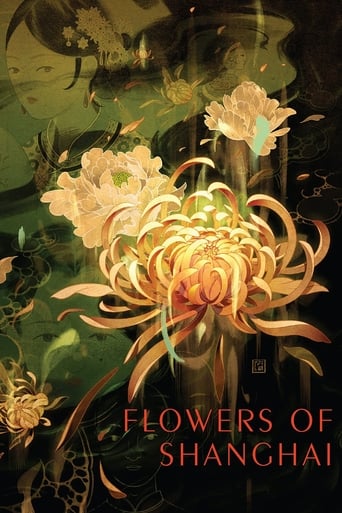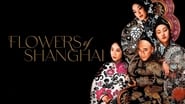Red-125
The film Hai shang hua was shown in the U.S. with the title Flowers of Shanghai (1998). It was directed by Hsiao-Hsien Hou.This movie is a Japanese film, but the dialog is in Cantonese, Mandarin, and the Wu language of Shanghai. (Although I haven't seen any confirmation of this, it looked to me as if some of the dialog was dubbed. Possibly the actors were speaking Japanese, but were dubbed into Chinese.)This is a meticulous, careful film about houses of prostitution in Shanghai in 1884. Four houses are represented, but I have to admit that it wasn't always clear to me in which house the action was taking place. These houses, called "Flower Houses," were only for the very wealthy and powerful. The furnishings were elegant, there were servants everywhere, and the women were very beautiful. Unlike what we outsiders know about geishas, these women didn't appear to be skilled in musical instruments or singing. Everyone understands that they perform their professional duties in the bedrooms. However, the houses are used for parties and drinking, with the women present as hostesses and onlookers. (Incidentally, in a film about prostitutes, there's absolutely no visible flesh--all the women are fully. and elegantly. clothed at all times.)The social hierarchy of both the "flowers" and their clients is carefully delineated and known to all. The "Aunties" rule the houses, but the women themselves have a carefully defined status. They are more like indentured servants than slaves, even though they have been purchased from their parents at a young age. Some of the women have their own servants, and the houses are full of cooks and waitresses.This film was shot completely indoors, in sets, in Japan. There's not a single scene shot outside one of the houses. People talk about going for a ride in the park, or for an evening at the opera, but we never see anyone actually do this. Instead, we have a complex indoor social world, with feuds, ambitions, betrayals, and greedy acts all taking place before us. Hou Hsiao-hsien is known for his long takes, and his slow dissolves. Typically, his camera doesn't move at all, although in this film it moves, but only slowly and carefully. This is a film that I highly recommend, although I admit that I wasn't always certain about the specifics of the plots. As I read the IMDb synopsis, I realized that I had missed some key elements. However, I still enjoyed the movie, and it will work--as it did for me--even if you can't always remember which flower is Jasmin and which is Jade.We saw this film as part of a Hou Hsiao-hsien retrospective at the wonderful Dryden Theatre at George Eastman House in Rochester. It will work on DVD, but it you get a chance to see it in a theater, go for it. It's interesting, powerful, and opens up a whole new world.
khsu
I feel like the human spirit almost completely disappeared into the opium smoke in this one, and I think that's Hou's and screenwriter Chu's intention, telling of a kind of fin-de-siecle decadence that mirrored their feelings about Taiwan and the world in the late 90s. Pretty, but ultimately vacuous and bleak, riddled with decay and death, perverse on the inside. (The preceding 'Goodbye South, Goodbye' and succeeding 'Millenium Mambo' are in the same vein.) It's a somewhat one-sided and curmudgeonly lamentous philosophical view of things, though, in my opinion.It's interesting the writer Eileen Chang originally translated Han Bangqing's novel from Wu into Mandarin because she was attracted precisely to the grand realism of the everyday human dynamics and stories in the book, to its profound warmth, especially in the foibles and failings of its characters. Here that's all but vanished, and we're left with a pretty surface, a scintillating exterior like a Faberge egg, with a void inside. Warmth in the film becomes stuffiness, smoke, suffocation, dark claustrophobic paranoia. It's cynical (but cynicism is simply the flipside of naivite), and I suspect it's more Chu's doing than Hou's. Hou's earlier films weren't like this; it's only when Chu became the sole writer (after co-writer Wu Nien-jen's departure after GSG) that Hou's movies became more and more self-gazing and decadent/indulgent.Which makes me wonder, what would another director (eg Edward Yang) have done with the same material?
yifan_tunan
This movie was absolutely brilliant.It was filmed in a manner that makes it seem more realistic than most movies. Each frame is beautiful.A note on dialect - This movie (with the exception of Leung to his mistress) is in Wu Chinese. Wu is hardly a minor language, spoken by well over 70 million people worldwide. It is spoken not only in Shanghai (the largest city in China) but the surrounding provinces, including such large cities as Suzhou and Wenzhou. It is actually more widely spoken than Cantonese and Taiwanese combined, making it the second-most-spoken variety of Chinese, dwarfed only by Mandarin. (70 million speakers is a lot of people; many national languages in Europe have fewer speakers) However, Wu is not spoken by as many overseas Chinese as are Cantonese, Mandarin, and Hokkien (aka Taiwanese, Minnan, etc), and for that reason less Westerners speak it. (in addition, Cantonese, Hokkien, and Mandarin are all the primary languages of at least one self-ruling political unit, even though the former two have less speakers than Wu)This is the only well-known movie with dialogue primarily in Wu, and it is based on the 19th century Wu novel by the same name (except read as Wu).
Paul Gallagher
This hypnotically beautiful film may recall a dream, but the material world of money and power, indentured servitude and beatings everywhere intrudes on it. We discover in the contrasting stories of Emerald, Pearl, Crimson, Jade, and Crystal, how some survive as "flower girls" and others are crushed. Far from being boring or cold, the film is compelling dramatically and emotionally. "Flowers of Shanghai" seems to contain boundless reserves of sadness and rage -- it is as if the sex and violence are not on screen because Hou cannot bear to show them. If "Flowers of Shanghai" is an opium dream, as many have said, the opium is both bringing pleasure and suppressing pain."Flowers of Shanghai" shows compassion for its characters, both the innocents and those who survive through cynical manipulation. The scene-length takes in medium shots work to establish respect for each person within the film, while at the same time bringing about a kind of "rectification of names," systematically exposing the hypocrisy of the brothels. It's appropriate that one of the few moments of violent action in the film occurs when Master Wang smashes the exquisite interior decoration in a room: "Flowers of Shanghai" shows the seductive beauty of the brothel then reveals it to be a cage. Everyone in the film is on multiple levels unfree: the women are financially bound to the brothels and dependent on the whims of their clients, and almost everyone is addicted to opium.The film never leaves the brothels. This expresses how the brothels in fact own the women. However, as Stephen Teo noted in CinemaScope, there's another detail that's easy to overlook: the women's bound feet prevent them from easily walking more than a few feet.




